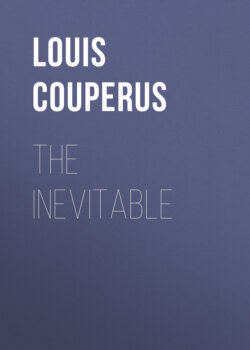Читать книгу The Inevitable - Louis Couperus - Страница 7
На сайте Литреса книга снята с продажи.
CHAPTER V
ОглавлениеTable of Contents
One evening Cornélie made the acquaintance of the Dutch family beside whom the Marchesa had first wished to place her at table: Mrs. van der Staal and her two daughters. They too were spending the whole winter in Rome: they had friends there and went out visiting. The conversation flowed smoothly; and mevrouw invited Cornélie to come and have a chat in her sitting-room. Next day she accompanied her new acquaintances to the Vatican and heard that mevrouw was expecting her son, who was coming to Rome from Florence to continue his archæological studies.
Cornélie was glad to meet at the hotel a Dutch element that was not antipathetic. She thought it pleasant to talk Dutch again and she confessed as much. In a day or two she had become intimate with Mrs. van der Staal and the two girls; and on the evening when young Van der Staal arrived she opened her heart more than she had ever thought that she could do to strangers whom she had known for barely a few days.
They were sitting in the Van der Staal’s sitting-room, Cornélie in a low chair by the blazing log-fire, for the evening was chilly. They had been talking about the Hague, about her divorce; and she was now speaking of Italy, of herself:
“I no longer see anything,” she confessed. “Rome has quite bewildered me. I can’t distinguish a colour, an outline. I don’t recognize people. They all seem to whirl round me. Sometimes I feel a need to sit alone for hours in my bird-cage upstairs, to recollect myself. This morning, in the Vatican, I don’t know: I remember nothing. It is all grey and fuzzy around me. Then the people in the boarding-house: the same faces every day. I see them and yet I don’t see them. I see ... I see Madame von Rothkirch and her daughter, I see the fair Urania ... and Rudyard ... and the little Englishwoman, Miss Taylor, who is always so tired with sight-seeing and who thinks everything most exquisite. But my memory is so bad that, when I am alone, I have to think to myself: Madame von Rothkirch is tall and stately, with the smile of the German Empress—she is rather like her—talking fast and yet with indifference, as though the words just fell indifferently from her lips....”
“You’re a good observer,” said Van der Staal.
“Oh, don’t say that!” said Cornélie, almost vexed. “I see nothing and I can’t remember. I receive no impressions. Everything around me is colourless. I really don’t know why I have come abroad.... When I am alone, I think of the people whom I meet. I know Madame von Rothkirch now and I know Else. Such a round, merry face, with arched eyebrows, and always a joke or a witticism: I find it tiring sometimes, she makes me laugh so. Still they are very nice. And the fair Urania. She tells me everything. She is as communicative ... as I am at this moment. And Rudyard: I see him before me too.”
“Rudyard!” smiled mevrouw and the girls.
“What is he?” Cornélie asked, inquisitively. “He is so civil, he ordered my wine for me, he can always get one all sorts of cards.”
“Don’t you know what Rudyard is?” asked Mrs. van der Staal.
“No; and Mrs. von Rothkirch doesn’t know either.”
“Then you had better be careful,” laughed the girls.
“Are you a Catholic?” asked mevrouw.
“No.”
“Nor the fair Urania either? Nor Mrs. von Rothkirch?”
“No.”
“Well, that is why la Belloni put Rudyard at your table. Rudyard is a Jesuit. Every pension in Rome has a Jesuit who lives there free of charge, if the proprietor is a good friend of the Church, and who tries to win souls by making himself especially agreeable.”
Cornélie refused to believe it.
“You can take my word for it,” mevrouw continued, “that in a pension like this, a first-class pension, a pension with a reputation, a great deal of intrigue goes on.”
“La Belloni?” Cornélie enquired.
“Our marchesa is a thorough-paced intrigante. Last winter, three English sisters were converted here.”
“By Rudyard?”
“No, by another priest. Rudyard is here for the first time this winter.”
“Rudyard walked quite a long way with me in the street this morning,” said young Van der Staal. “I let him talk, I heard all he had to say.”
Cornélie fell back in her chair:
“I am tired of people,” she said, with the strange sincerity which was hers. “I should like to sleep for a month, without seeing anybody.”
And, after a short pause, she got up, said goodnight and went to bed, while everything swam before her eyes.
